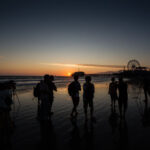Many photographers swear by the idea that you should always shoot in RAW. While not a bad idea per se, there are certain situations where shooting in JPEG makes more sense. The matter of whether to shoot in RAW or JPEG is thus very much situational. In today’s insightful video, we have photographer Phil Steele who talks about the real truth in the RAW vs JPEG war:
If you are completely new to photography, it helps to understand that RAW images contain unprocessed image data. The images lack any sort of enhancements or adjustments and can appear a bit bland. They’re also uncompressed, so they contain a huge amount of data that you can play with. On the other hand, JPEG images are processed and highly compressed by the camera’s processor. Therefore, they have much less flexibility when it comes to editing.
In the video, Steele walks you through in detail about the advantages and disadvantages of both RAW and JPEG files. He also talks about the certain situations where each file type performs better. This way, instead of always sticking to a particular file type, you can choose what you want to work with.
RAW files are flexible, but their bigger file size means that you’ll run out of storage space faster. Also, the camera will struggle to maintain its speed when shooting continuous bursts.
On the other hand, although you don’t get more flexibility with JPEG files, you save a lot of storage space. Also, your camera will have no problem shooting bursts.
“As a rule of thumb, when I’m trying to create art, I shoot RAW.”
It is therefore a good idea to shoot in RAW when the quality of work needs to be high, or when lighting conditions are tricky. But if you’re shooting for documentary purpose, or when the speed of work and delivery is more important than quality, then go for JPEGs.
Be sure to watch the complete video as you’ll get an in-depth insight on both of the file types. You can then easily decide whether shooting in RAW or JPEG is the better fit.
For further training: Understanding Your Camera Course
Like This Article?
Don't Miss The Next One!
Join over 100,000 photographers of all experience levels who receive our free photography tips and articles to stay current:






Leave a Reply